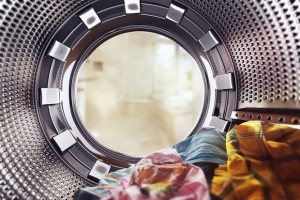AquaFresco provides the state-of-the-art filtration technology which regenerates 95% of laundry wastewater. Three MIT grad students have invented a washing-machine filter that cleans wastewater and reuses it over and over again. “Washing machines are one of the major sources of detergent pollution in rivers,” Huang says. “Current laundry technology is not sustainable. A regular washer discards the water right into the drain after one usage, but less than 1 percent is the actual waste component.” What AquaFresco does is filter out the small amount of waste and recycle the clean water and detergent for further cleaning cycles. If it works as Huang, Rwei, and Lai hope, you could use essentially the same batch of water to wash laundry for up to six months (replenished by the small percent that’s not recycled). In turn, this would mean much less detergent being released into the groundwater supply.
The science behind AquaFresco has to do with reducing the surface energy between the water and the waste. It uses an absorption filtration system, unlike other filters that might use a fine mesh to separate waste by size. The outlet of the washer connects to the inlet of the AquaFresco filter, and wastewater goes through the filter, then out the filtration unit, and back to the washer for closed-loop cleaning.To test how effective the system is, the creators have targeted the hotel industry, which has high water usage, a large volume of laundry, and strict standards for cleanliness in linens. In American hotels, the biggest use of water is not swimming pools, they only account for 1 percent, in fact but restrooms, followed by laundry. Water consumption is seen as a privilege you’re paying for, so guests may be more likely to take a long, hot shower in a hotel than at home. And all those showers add up. Many hotels now try to educate their guests about water use, and this has gotten results, according to the U.S. Environmental Protection Agency, whose WaterSense H2Otel Challenge has partnered with hundreds of hotels to lower water consumption, sometimes by as much as 40 percent. But to find other ways to cut back, hotels are now looking at their second-biggest water culprit.
Washing all those towels requires a lot of water millions of gallons a year at big hotels. Some larger resort hotels have switched to high-efficiency tunnel washers, which push soiled laundry continuously through a tunnel, reusing water in one long cycle. But tunnel washers are expensive, take up a great deal of space, and still use about two gallons of water per pound of linen. A 400-room hotel at 65 percent capacity would process about 1 million pounds (11 pounds per room) of laundry a year so that’s a lot of water. An AquaFresco filter would allow hotels to adapt almost any commercial machine to use far less water than a tunnel washer. It would be an appealing option for hotel owners unwilling to invest in new machines or unable to find space for them. It would also cut their water bills substantially. At the moment, AquaFresco is being beta-tested at an island resort off the coast of New Hampshire, where fresh water has to be shipped in from the mainland. If the filter is a success, Huang thinks it could affect tourism more broadly, bringing more full-service hotels to remote places (because it cuts down so much on the need for fresh water). Viability in remote locations could also spell a future for AquaFresco in developing countries where water is hard to come by, and where women are disproportionately burdened with finding water to do laundry.
AquaFresco’s creators have made the prototype of a unit for small hotels or households. Such a product could have a dramatic effect, since laundry accounts for up to 20 percent of the average homeowner’s indoor water consumption. Huang says they might eventually apply the technology to industrial cleaners and car washes but the next frontier may be even bigger. “We did get contacted by people working on a NASA project,” Huang says. “Nowadays, NASA spends millions of dollars on shipping new clothes up to the space station for the astronauts, and they are looking for a more efficient way to do laundry up there.”
For more information please visit: www.aquafresco.co

